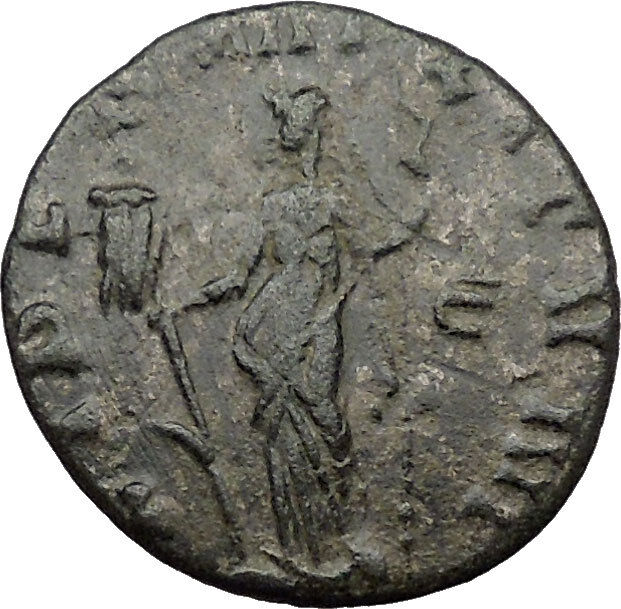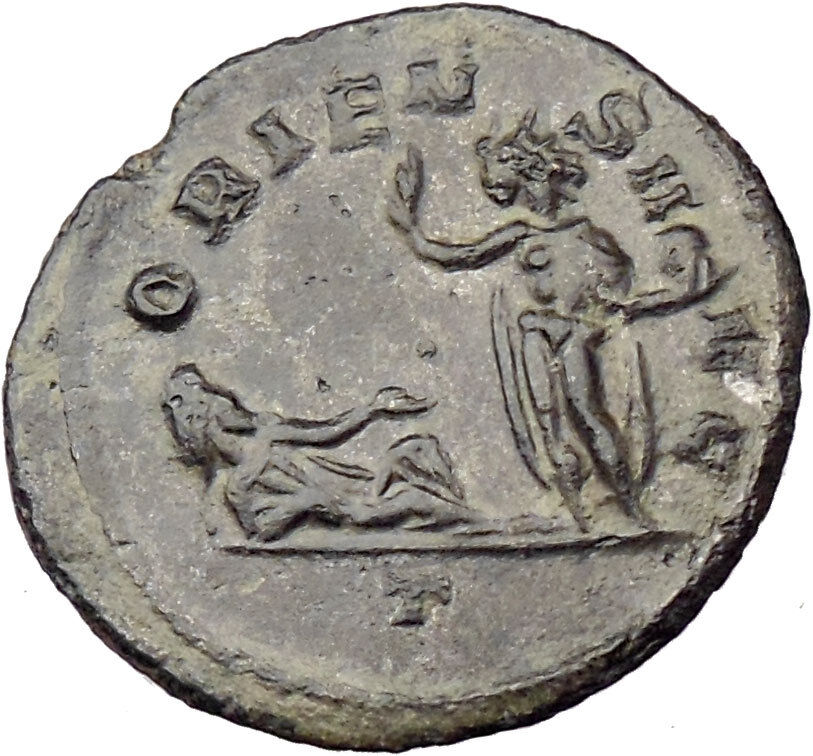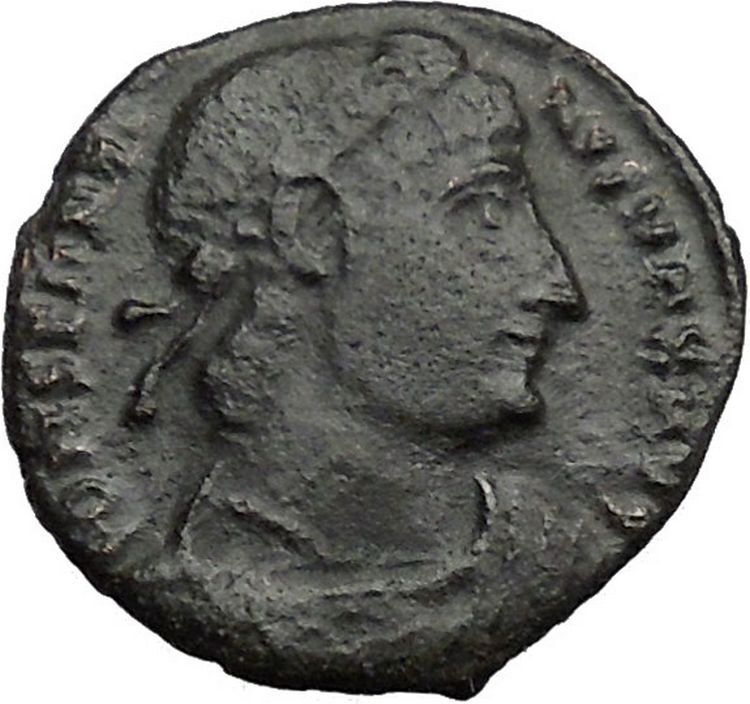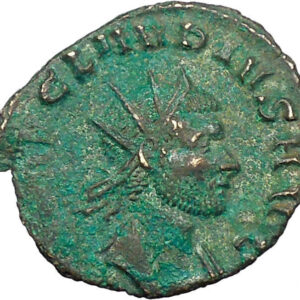|
Crispina – Roman Empress: 177-183 A.D.
Bronze Dupondius 23mm (13.64 grams) struck under Marcus Aurelius and Commodus.
Rome mint, struck circa 178-182 A.D.
Reference: Cohen 37. RIC 684
CRISPINA AVGVSTA Draped bust of Crispina ro right.
VENVS / S C Venus standing facing, head left, holding apple on her extended right hand and raising her veil with her left.
You are bidding on the exact item pictured, provided with a Certificate of Authenticity and Lifetime Guarantee of Authenticity.
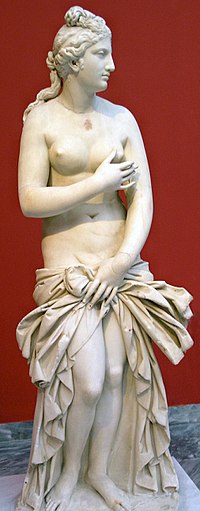 Venus was a Roman goddess principally associated with love, beauty and fertility, who played a key role in many Roman religious festivals and myths. From the third century BC, the increasing Hellenization of Roman upper classes identified her as the equivalent of the Greek goddess Aphrodite. Venus was a Roman goddess principally associated with love, beauty and fertility, who played a key role in many Roman religious festivals and myths. From the third century BC, the increasing Hellenization of Roman upper classes identified her as the equivalent of the Greek goddess Aphrodite.
Her cult began in Ardea and Lavinium, Latium. On August 15, 293 BC, her oldest known temple was dedicated, and August 18 became a festival called the Vinalia Rustica. After Rome’s defeat at the Battle of Lake Trasimene in the opening episodes of the Second Punic War, the Sibylline oracle recommended the importation of the Sicillian Venus of Eryx; a temple to her was dedicated on the Capitoline Hill in 217 BC: a second temple to her was dedicated in 181 BC.
Venus seems to have played a part in household or private religion of some Romans. Julius Caesar claimed her as an ancestor (Venus Genetrix); possibly a long-standing family tradition, certainly one adopted as such by his heir Augustus. Venus statuettes have been found in quite ordinary household shrines (lararia). In fiction, Petronius places one among the Lares of the freedman Trimalchio’s household shrine.
 Crispina – Augusta: 177-182/3 A.D. Crispina – Augusta: 177-182/3 A.D.
| Wife of Commodus | Daughter-in-Law of Marcus Aurelius and Faustina Junior |
Bruttia Crispina (164-183 A.D.) was the Empress of Rome and wife of Roman Emperor Commodus.
Crispina’s mother is unknown and her father was twice consul Gaius Bruttius Praesens. Crispina’s paternal grandparents were consul and senator Caius Bruttius Praesens and rich heiress Laberia Hostilia Crispina, who was the daughter of another twice consul, Manius Laberius Maximus. Crispina’s brother was future consul Lucius Bruttius Quintius Crispinus. Her father’s family originally came from Volceii, Lucania, Italy and were closely associated with the Roman Emperors Trajan, Hadrian, Antoninus Pius and Marcus Aurelius. Crispina was born and raised in Rome or Volceii.
 Crispina married Commodus, in the summer of 178 (probably July). The actual ceremony was modest but it was commemorated on coinage and largesse was distributed to the people. An epithalamium for the occasion was composed by the sophist Julius Pollux. Like many marriages of young members of the upper orders, it was an arranged marriage: Crispina’s father and Marcus Aurelius (Commodus’ father) had arranged for it to occur. Commodus disliked Crispina, presumably due to her character – she was a beautiful woman, but said to be vain and haughty. She received the title of Augusta. Crispina married Commodus, in the summer of 178 (probably July). The actual ceremony was modest but it was commemorated on coinage and largesse was distributed to the people. An epithalamium for the occasion was composed by the sophist Julius Pollux. Like many marriages of young members of the upper orders, it was an arranged marriage: Crispina’s father and Marcus Aurelius (Commodus’ father) had arranged for it to occur. Commodus disliked Crispina, presumably due to her character – she was a beautiful woman, but said to be vain and haughty. She received the title of Augusta.
On the basis of a misreading of SHA Commodus 5.9 and Dio 73.4.6 her fall is sometimes wrongly associated with the conspiracy of Lucilla in 181 or 182. Her name continues to appear in inscriptions until as late as 191 (CIL 8.2366). Her eventual exile and death may instead have been associated with the fall of Marcus Aurelius Cleander or her inability to help Commodus ensure the dynastic succession.
Commodus – Roman Emperor: 177-192 A.D.
 Caesar: 166-177 A.D. (under Marcus Aurelius) | (166-169/170 A.D. with Annius Verus) | (169/170-177 Alone) | Caesar: 166-177 A.D. (under Marcus Aurelius) | (166-169/170 A.D. with Annius Verus) | (169/170-177 Alone) |
Augustus: 177-192 A.D. (177-180 A.D. with Marcus Aurelius) (180-192 A.D. Sole Reign)
Son of Marcus Aurelius and Faustina Junior | Husband of Crispina | Brother of Annius Verus, Lucilla and Aurelius Antoninus | Grandson of Antoninus Pius and Faustina Senior |
Commodus (Latin: Marcus Aurelius Commodus Antoninus Augustus; 31 August, 161 AD – 31 December, 192 AD), was Roman Emperor from 180 to 192. He also ruled as co-emperor with his father Marcus Aurelius from 177 until his father’s death in 180.
His accession as emperor was the first time a son had succeeded his father since Titus succeeded Vespasian in 79. He was also the first Emperor to have both a father and grandfather as the two preceding Emperors. Commodus was the first (and until 337 the only) emperor “born in the purple”; i.e. during his father’s reign.
Commodus was assassinated in 192.
|





 Venus was a Roman goddess principally associated with love, beauty and fertility, who played a key role in many Roman religious festivals and myths. From the third century BC, the increasing Hellenization of Roman upper classes identified her as the equivalent of the Greek goddess Aphrodite.
Venus was a Roman goddess principally associated with love, beauty and fertility, who played a key role in many Roman religious festivals and myths. From the third century BC, the increasing Hellenization of Roman upper classes identified her as the equivalent of the Greek goddess Aphrodite. Crispina – Augusta: 177-182/3 A.D.
Crispina – Augusta: 177-182/3 A.D. Crispina married Commodus, in the summer of 178 (probably July). The actual ceremony was modest but it was commemorated on coinage and largesse was distributed to the people. An epithalamium for the occasion was composed by the sophist Julius Pollux. Like many marriages of young members of the upper orders, it was an arranged marriage: Crispina’s father and Marcus Aurelius (Commodus’ father) had arranged for it to occur. Commodus disliked Crispina, presumably due to her character – she was a beautiful woman, but said to be vain and haughty. She received the title of Augusta.
Crispina married Commodus, in the summer of 178 (probably July). The actual ceremony was modest but it was commemorated on coinage and largesse was distributed to the people. An epithalamium for the occasion was composed by the sophist Julius Pollux. Like many marriages of young members of the upper orders, it was an arranged marriage: Crispina’s father and Marcus Aurelius (Commodus’ father) had arranged for it to occur. Commodus disliked Crispina, presumably due to her character – she was a beautiful woman, but said to be vain and haughty. She received the title of Augusta. Caesar: 166-177 A.D. (under Marcus Aurelius) | (166-169/170 A.D. with Annius Verus) | (169/170-177 Alone) |
Caesar: 166-177 A.D. (under Marcus Aurelius) | (166-169/170 A.D. with Annius Verus) | (169/170-177 Alone) | 

